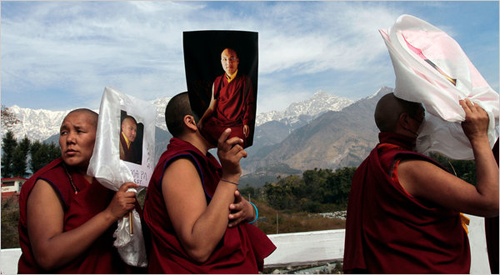
Last Monday, when I came to work, I was very sad to learn that the monastery of Ogyen Trinley Dorje, a young lama recognized as the 17th Karmapa, was raided by Indian police. A large amount of cash was seized in the raid. I quickly (perhaps too quickly) blogged about it, asking for anyone with any insight into the situation to share their thoughts with us via info@tricycle.com
Many emails have come in, ranging from insightful to insane, and quite frankly, I don’t really know what to make of it all. All I really know is that the situation is very sad and that there is obviously much more rumor, speculation, and accusation than solid, fact-based evidence floating around. While the Karmapa’s office continues to issue reports addressing various and often questionable allegations, there is little else to go on aside from the rather sensationalistic reports in the Indian media.
It’s a time—regardless of one’s feelings on the matter—to wait for more facts to surface before jumping to any conclusions. The Karmapa has lived under house arrest since he arrived in India from Tibet at the age of 14 and has more recently been denied a visa to travel. He does not have Indian citizenship; is prohibited by Indian authorities from having a bank account, and cannot legally buy land in the province in which he lives.
Now that the Times has featured the incident on the front page of today’s paper, we hope this will encourage others to determine the facts with more objectivity than the Indian press (or The Economist, for that matter).
We send our best wishes and thoughts to the Karmapa and to others whom this has affected.
DHARAMSALA, India — His daring escape from Tibet seemed out of a movie. Then only 14, Ogyen Trinley Dorje was one of Tibetan Buddhism’s most revered incarnate lamas, and his journey through the icy passes of the Himalayas was viewed as a major embarrassment for China. The youth arrived in India in early 2000 to a euphoric greeting from Tibetan exiles.
India, though, was less certain about what to do with him. Intelligence agencies, suspicious of his loyalties and skeptical of his miraculous escape, interrogated him and tightly restricted his travel. He remains mostly confined to the mountainside monastery of a Tibetan sect different from his own. And that spurred an idea: He wanted his own monastery. Eventually, his aides struck a deal to buy land.
Now, the 17th Karmapa, as he is known, has seen his quest for a monastery unexpectedly set off a national furor, fanned by Indian media that have tapped into growing public anxiety about Chinese intentions on their disputed border.
The Indian police are investigating the Karmapa after discovering about $1 million in foreign currency at his residence, including more than $166,000 in Chinese currency. Flimsily sourced media accounts have questioned whether he is a Chinese spy plotting a monastic empire along the border.
“Monk or Chinese Plant?” asked an editorial in The Tribune, a national English-language newspaper.
Many Tibetans scoff at the spying allegations. But the episode starkly exposes the precarious position of the Dalai Lama and the exiled movement of Tibetan Buddhism he has led since he fled China in 1959. The Tibetan cause depends heavily on Indian good will, particularly as China has intensified efforts to discredit and infiltrate their exile organization.
Tensions are rising between India and China over a variety of issues, including Tibet. Sophisticated hackers, traced to China, have penetrated computer systems in Dharamsala and at Indian government ministries. China has long blamed Tibetan exiles in India for fueling instability across the border in Tibet. But now India, too, seems more wary of Tibetan activities; the Indian police are investigating new Tibetan monasteries near the border for possible ties to China, a police official said.
Meanwhile, Chinese leaders are betting that the Tibetan movement will fracture after the eventual death of the Dalai Lama, who is 74; they have even declared their intent to name his successor.
Indian suspicions about the Karmapa are a particular problem. He has a global following and, at 25 years old, he is viewed as a potential future leader of the movement — a possibility deeply compromised if Indian authorities consider him a foreign agent.
“What Tibetans must address is the idea that Tibetans could be considered a security threat to India and not an asset,” said Tsering Shakya, a leading Tibet specialist. “But the idea that a boy at the age of 14 was selected as a covert agent by a foreign government to destabilize India — and the assumption the boy will assume leadership of the Tibetan movement and eventually work against India — is worthy of a cheap spy novel.”
Read the complete piece here.
Image via The New York Times